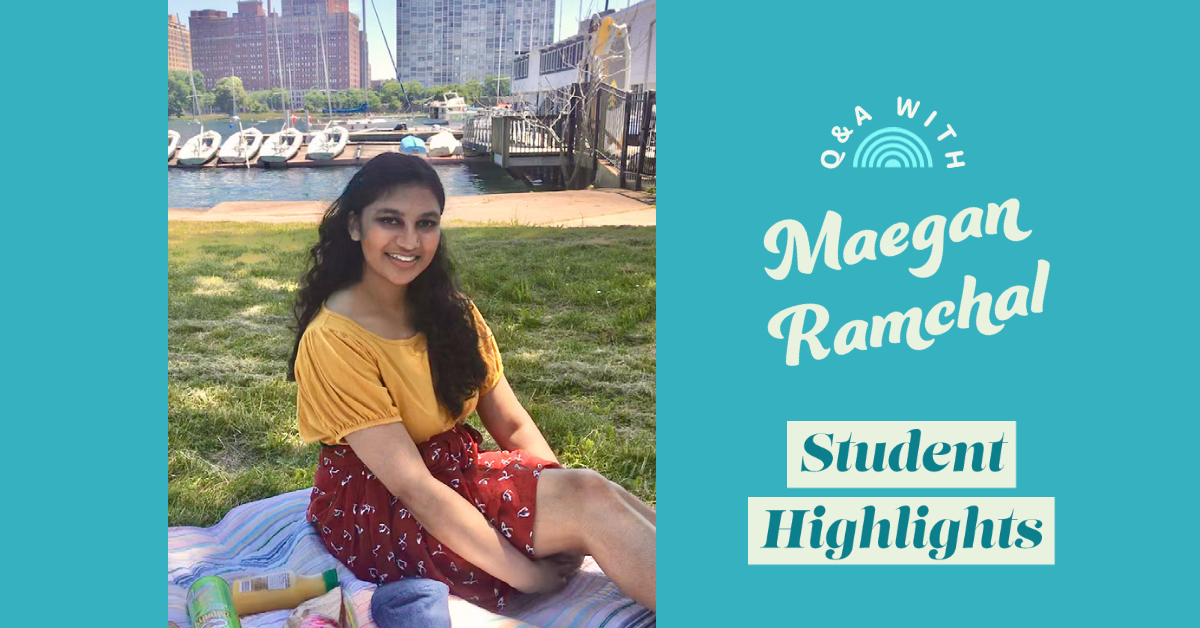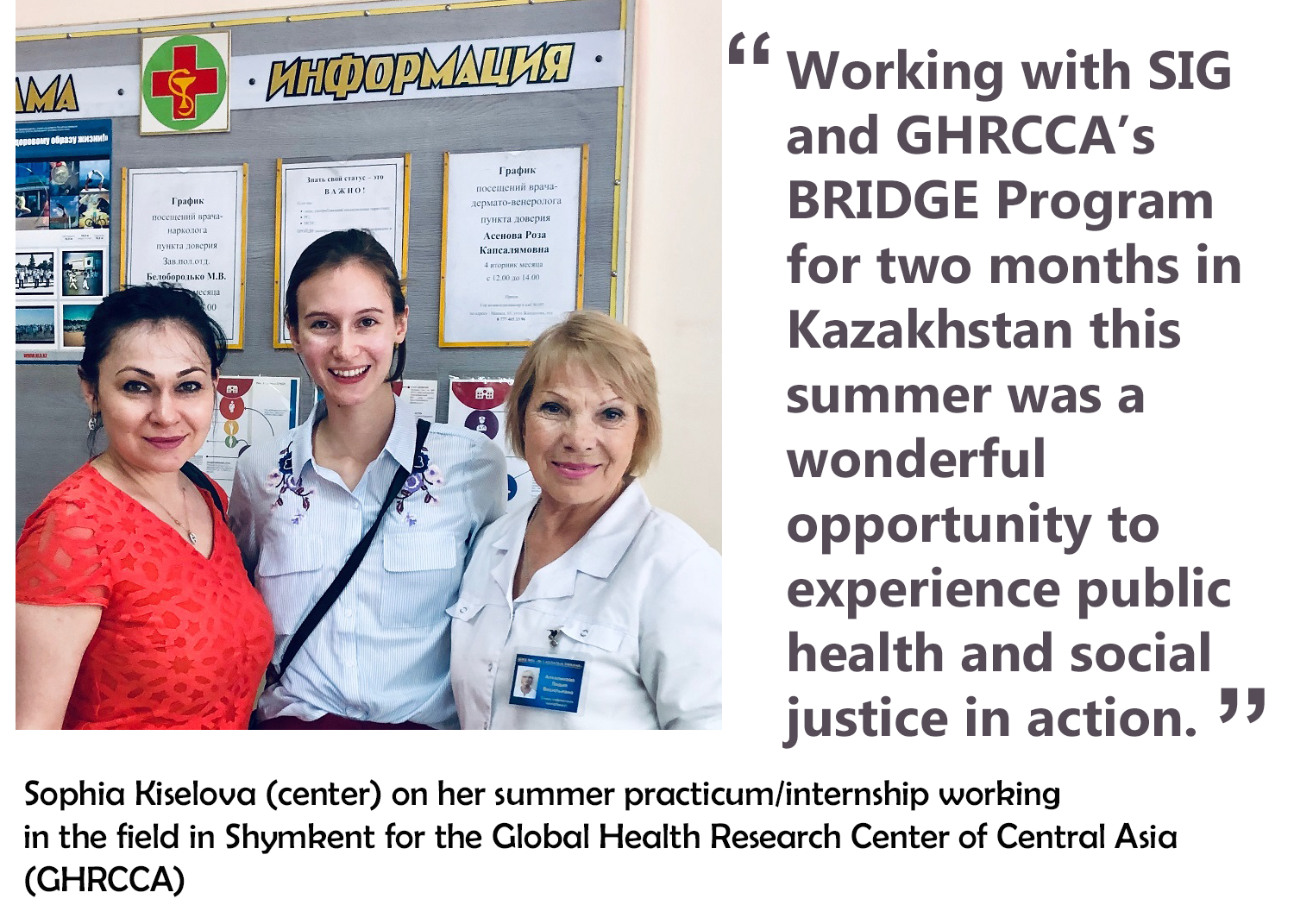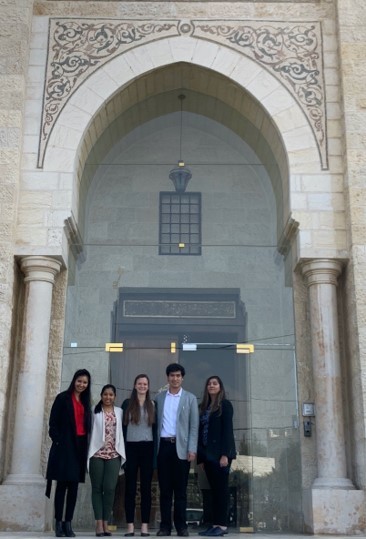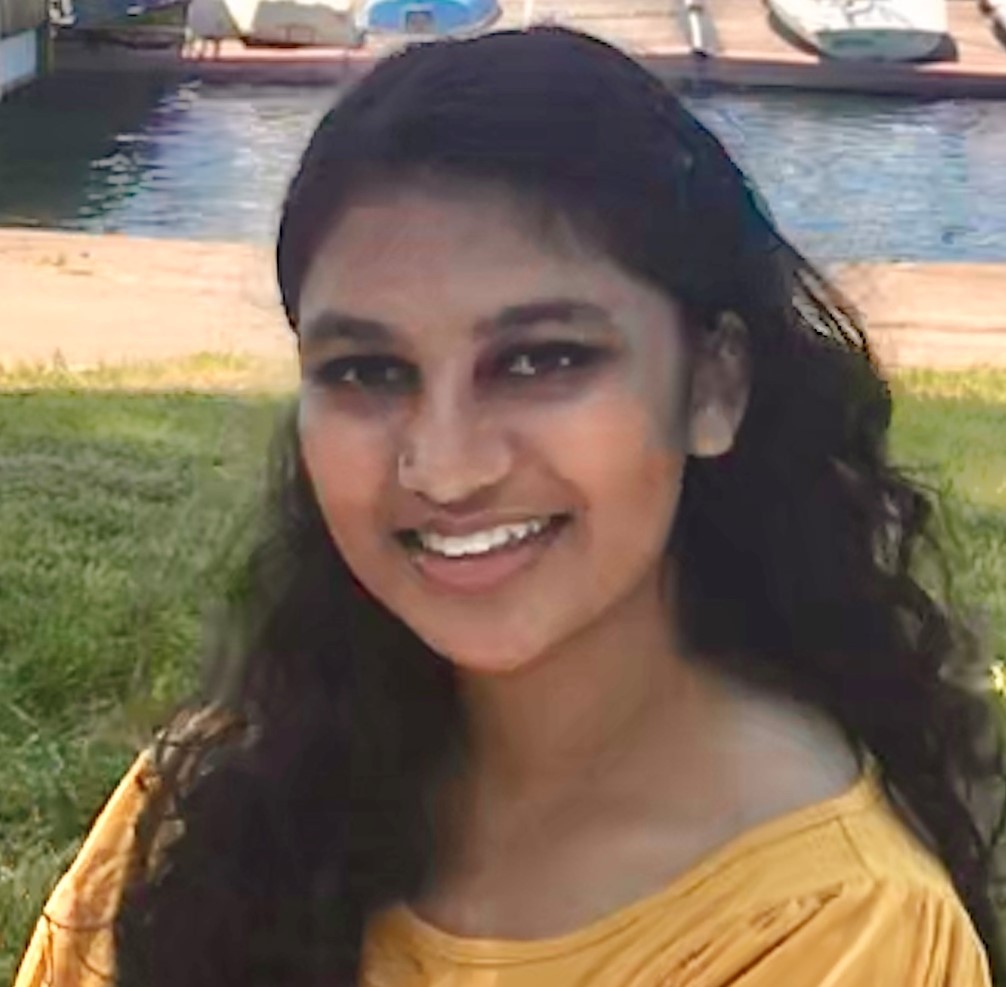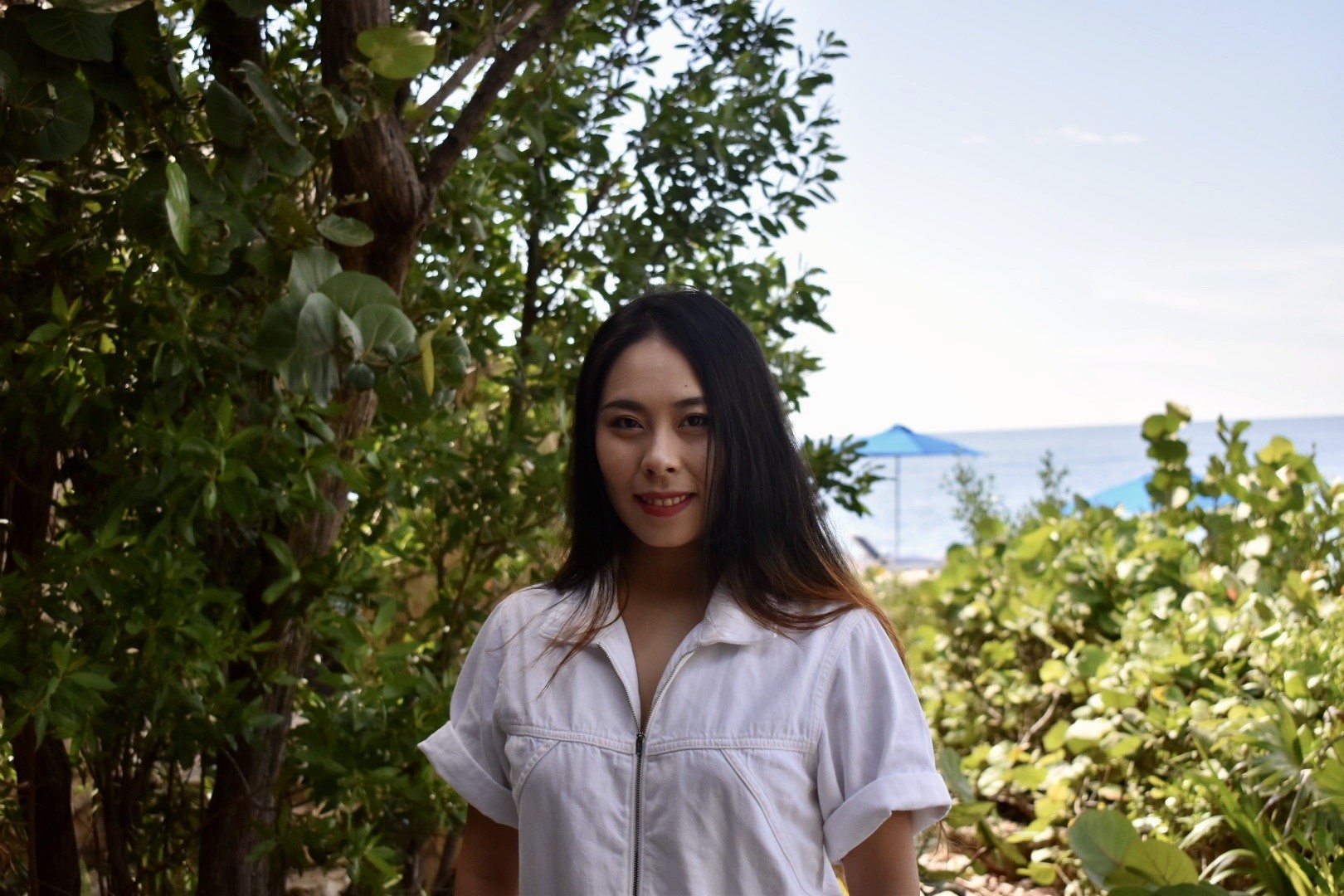The contribution of students is central to achieving the mission of the Social Intervention Group (SIG). Even during COVID-19, opportunities for students to engage in our work abound.
Traditionally, students at the Columbia University School of Social Work apply for various field practice opportunities throughout the School, which, as the name suggests, takes place “in the field, real world settings ” or natural environment (read: not Zoom). In fact, past students who have worked for the Social Intervention Group (SIG) have been placed as far afield as Almaty, Kazakhstan and Amman, Jordan or as near as New York City.
SIG has provided field placements for School of Social Work students who want to learn about research on evidence-based practices for many health and social problems such as intimate partner violence, HIV, inequities in reproductive health, and substance use.
Students report on global social justice work at GHRCCA
SIG also works with underserved populations including racial, sexual, and gender minorities and refugee populations.
The Importance of Collaborations to Foster Mental Health Solutions for Syrian Refugee Women
Students learn from social work researchers about the role of research in designing interventions, and improving implementation of interventions in real world settings and involving communities and their voices.
Student opportunities typically include intensive social work fieldwork training for MSW students and opportunities for doctoral students to gain direct, hands-on experience in all phases of research.
At a time when travel and field placement are not possible for good reason, what opportunities do prospective students have to work with SIG? To answer, in part, current and past students shared their experiences. We also asked a new student -- Maegan Ramchal -- questions about her upcoming work with SIG.
Q&A with MSW Student Maegan Ramchal
Maegan Ramchal is a first-year MSW student at Columbia School of Social Work with a concentration in advanced clinical social work with a focus in health, mental health, and disabilities. At SIG, she is working on adapting the WINGS intervention -- a tool enabling participating women who experience intimate partner violence and use drugs to develop safety planning strategies and strengthen their social support networks -- for the Caribbean. She is also working on the HEALing Communities Study (HCS).
How did you discover SIG, and why did you apply?
I was looking for a research opportunity for MSW students. Research is important to me, and I spend my undergrad doing psychology research. Once I was a student, I looked at research centers and SIG had all the components I was interested in, including working with those impacted by intimate partner violence and trauma, as well as immigrant and Caribbean populations. (My family is from Guyana, a part of the Caribbean.)
In fact, I wrote about SIG in my personal statement for Columbia. Since I was looking for field placement in a weird year, I didn’t choose the option where they find a placement for you. During orientation week Audrey Ward mentioned SIG was looking for students.
I want to be a clinical social worker, but there is a divide between social work clinicians and researchers. Doing both allows you to see both the academic and clinical perspective. I always knew I needed to do both.
Did anything surprise you about working for SIG?
SIG as a whole. I was surprised at how much opportunity for input I had on things I could work on.
What projects have you worked on?
One project I’m working on is adapting the WINGS intervention for the Caribbean. In preparation for the adaptation, we are going to be conducting focus groups , but the first step of the adaptation is conducting a systematic review for the Caribbean.
I’m also working on starting qualitative interviews for the HEALing Communities Study (HCS). In an attempt to address racial disparities, I will be talking with pharmacists to review their prescribing methods between races, such as who is able to receive buprenorphine.*
In addition to conducting the interviews I might be coding the data.
Tell me more about the independent study you are working on with Dr. Louisa Gilbert.
We are looking at a systematic review for intimate partner violence, specifically intimate partner interventions and mental health in the Caribbean and implications from COVID.
SIG’s work is centered around addressing racial inequities and injustice, so racial justice is at the heart of a lot of the research I’m doing at SIG.
Drs. Nabila El-Bassel and Louisa Gilbert: Selected as top 25 top cited intimate partner violence researchers
Explain systematic review for the lay person.
Systematic review produces a specific kind of paper. The researcher comes up with a question and search strategy then pulls the literature that comes up. They go through abstracts, narrowing down the list of papers to review. Then, they review the full text and make the last round of exclusion and extract.
What should other students know before applying?
SIG is very supportive. If you do not have a research background, this is a good way to attain it. Many social worker students don’t have a research background. During COVID19 it has helped to learn how to work independently. It’s much easier to do research with a team than by yourself.
How does racial justice fit into your work with SIG?
SIG’s work is centered around addressing racial inequities and injustice, so racial justice is at the heart of a lot of the research I’m doing at SIG. I need to be careful regarding work with vulnerable populations by not arriving with a savior mindset or doing work that is not actually useful. As an intern I can’t change too much but I appreciate this focus.
I am also involved with the HCS Black Justice subcommittee. It’s really good, we meet twice a month. Everyone is passionate and committed to making changes. We are focusing more on underserved communities with disproportionately higher rates of opioid use who are disproportionately harmed from the outcomes.
I am most excited about this work to address social, health, and racial disparities, as well as gender-based violence and racism. I want to help reduce these inequities.
* Editor’s note relating to the Pharmacy research: A study of 662 pharmacists in New York found that “Pharmacies in poorer neighborhoods were less likely to have naloxone.” Therefore, the people who desperately need this life-saving treatment -- primarily those in neighborhoods with predominantly people of color -- do not receive it. The resulting publication by former SIG student Bilal Abbas and collaborators is: “Socio-ecological and pharmacy-level factors associated with naloxone stocking at standing-order naloxone pharmacies in New York City.” In part, it concludes: “There is an urgent need to scale up naloxone distribution, particularly in low income and predominantly Black neighborhoods to redress emerging socioeconomic and racial disparities in opioid death rates.” This urgent need also includes Buprenorphine.
Other Student Experiences
Student Joy Zhang also shared her experiences working with SIG. At SIG, Ms. Zhang codes qualitative interviews for the HEALing Communities Study and is conducting a quantitative data analysis on a new study led by Dr. Dawn Goddard-Eckrich, which aims to examine the availability of COVID-19 testing and the impact of COVID-19 on the availability of naloxone and buprenorphine comparing pharmacies in racially diverse communities.
Ms. Zhang says, "I am so glad that I was placed on SIG in my advanced year to explore my professional interests and build up a skill set for future research.” Specifically,
In this semester, I have deepened my knowledge on PROP over different social issues and various minority groups. I also learned how to start to prepare for an intervention project and the development of a manuscript of a research paper.
PROP (Power, Race, Oppression, and Privilege) courses are designed to “foster brave spaces where students, faculty and staff can engage in critically analyzing and addressing institutionalized racism, multi-systemic inequities, and various forms of oppression, thus creating an environment where diversity, equity and inclusion are at the center of our research, scholarship and all interactions with individuals, organizations and communities that we serve" per the office of Diversity, Equity, and Inclusion.
Provost Office Awards to Advance School’s Anti-Racist Curriculum
She continues: “I appreciate the atmosphere of free exploration here as well as I can put my ideas into practice. I would look forward to the upcoming semester and more exciting projects."
Another student shares that she is “Grateful for the different meetings that SIG offers – particularly the Black Justice HCS subgroup meetings.” The student continues:
My intention for graduate school has not only been to develop research skills, but to develop them with an anti-racist, anti-oppressive lens.
The student also said “The Black Justice HCS subgroup meetings are some of the first professional meetings that I have attended that not only call out the racial/ethnic disparities among different social and health outcomes, but they call out the system of white supremacy that uphold it.”
Through the work with the Black Justice group the student plans to “take actionable steps to practice anti-racist, anti-oppressive research that align with the guidance of these meetings.”
Other students have gone on to work for SIG, most recently Phoebe Kelleher who now serves as the Research Coordinator for the HEALing Communities Study. As shared here, Ms. Kelleher said, “When I first started working as an MSW student with the HEALing Communities Study, I was encouraged by the emphasis on community-specific approaches and the prioritization of evidence-based practices to reduce opioid overdoses. I found it rewarding to use my educational background at Columbia School of Social Work and my professional background in Substance Use Disorder to contribute to an innovative study on this scale.”
Current and past students have also worked on the Building Social Service Workforce Competencies in Europe and Central Asia training program designed to help expand the field of social work where it is critically needed in Central Asia and Eastern Europe.
In addition to the above important work, current students are working on projects related to COVID-19 such as Adolescent Responses to COVID-19 (ARC), which examines adolescents' patterns of social connectedness during the COVID-19 pandemic and impacts on adolescent mental health through a mobile app and smartwatch, and a study through the Columbia Center for Healing of Opioid and Other Substance Use Disorders (CHOSEN) examining the impact of substance use policy changes due to COVID-19.
Students also receive extensive training and mentorship, and will gain skills in interviewing, data collection, qualitative data analysis, manuscript development, study adaptation, transcription, program evaluation, curriculum development, and more.
How to get involved
Criteria & Applying
SIG seeks Social Enterprise Administration (SEA) or Advanced Generalist Practice & Programming (AGPP) majors who are self-starters with an interest in research or non-profits and international development.
Interested in applying? MSW students can email Dawn Goddard-Eckrich at [email protected].

